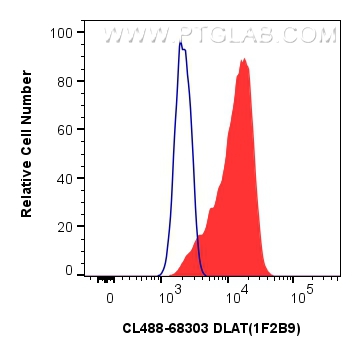验证数据展示
经过测试的应用
| Positive IF/ICC detected in | HepG2 cells |
| Positive FC (Intra) detected in | HepG2 cells |
Planning an IHC experiment? We recommend our IHCeasy DLAT Ready-To-Use IHC Kit. DLAT primary antibody included.
For other applications, we recommend the unconjugated version of this antibody, 68303-1-Ig
推荐稀释比
| 应用 | 推荐稀释比 |
|---|---|
| Immunofluorescence (IF)/ICC | IF/ICC : 1:200-1:800 |
| Flow Cytometry (FC) (INTRA) | FC (INTRA) : 0.40 ug per 10^6 cells in a 100 µl suspension |
| It is recommended that this reagent should be titrated in each testing system to obtain optimal results. | |
| Sample-dependent, Check data in validation data gallery. | |
产品信息
CL488-68303 targets DLAT in IF/ICC, FC (Intra) applications and shows reactivity with human, mouse, rat samples.
| 经测试应用 | IF/ICC, FC (Intra) Application Description |
| 经测试反应性 | human, mouse, rat |
| 免疫原 | DLAT fusion protein Ag4226 种属同源性预测 |
| 宿主/亚型 | Mouse / IgG2b |
| 抗体类别 | Monoclonal |
| 产品类型 | Antibody |
| 全称 | dihydrolipoamide S-acetyltransferase |
| 别名 | PDC-E2, ODP2, EC:2.3.1.12, DLTA, Dihydrolipoyllysine-residue acetyltransferase component of pyruvate dehydrogenase complex, mitochondrial |
| 计算分子量 | 647 aa, 70 kDa |
| 观测分子量 | 69-70 kDa |
| GenBank蛋白编号 | BC039084 |
| 基因名称 | DLAT |
| Gene ID (NCBI) | 1737 |
| RRID | AB_3672992 |
| 偶联类型 | CoraLite® Plus 488 Fluorescent Dye |
| 最大激发/发射波长 | 493 nm / 522 nm |
| 形式 | Liquid |
| 纯化方式 | Protein A purification |
| UNIPROT ID | P10515 |
| 储存缓冲液 | PBS with 50% glycerol, 0.05% Proclin300, 0.5% BSA , pH 7.3 |
| 储存条件 | Store at -20°C. Avoid exposure to light. Stable for one year after shipment. Aliquoting is unnecessary for -20oC storage. |
实验方案
| Product Specific Protocols | |
|---|---|
| IF protocol for CL Plus 488 DLAT antibody CL488-68303 | Download protocol |
| Standard Protocols | |
|---|---|
| Click here to view our Standard Protocols |

